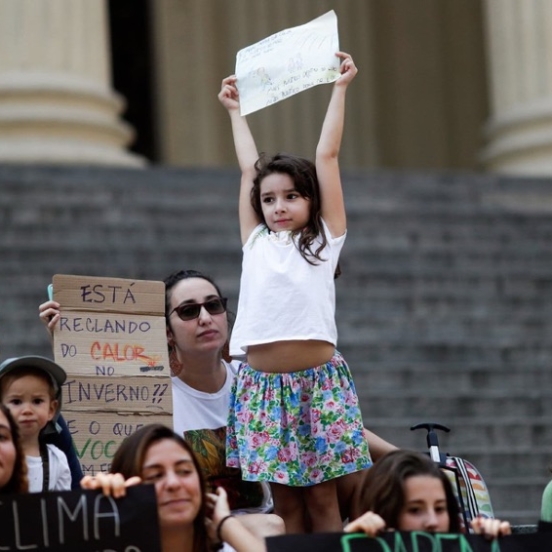Climate, Health and Equity Brief
Childhood asthma, climate anxiety, and a year for ambitious policymaking
January 18, 2022

The Climate, Health & Equity Brief is GMMB’s take on the week’s news on the current impacts of climate change. If you haven’t subscribed yet, you can do so by clicking here.
Hot Topic: For the children. Two new studies this week illustrate the very real impact emissions and climate change are already having on the world’s young people.
One study found that 1.85 million new cases of childhood asthma diagnosed worldwide in 2019—or 8.5 percent of all new cases—are linked to nitrogen dioxide exposure from diesel vehicles. While this count is down from 13 percent in previous years, these improvements aren’t distributed equitably. Nitrogen dioxide-associated cases of childhood asthma fell by 41 percent in high-income countries thanks to stricter emissions standards, but cases continued to rise in south Asia and sub-Saharan Africa, with more than two thirds of cases identified in urban areas.
In a study among 16 to 25-year-olds across 10 countries, 45 percent say that climate anxiety and distress affect their daily lives, and fully 75 percent say they are frightened about the future. Any many specifically blame government inaction for their climate anxiety: 64 percent say their governments aren’t doing enough to avoid a climate catastrophe and 58 percent say that government leaders are betraying future generations.
Climate experts agree, noting that 2021 was a disappointing year for climate action in the U.S. that was marked by failed negotiations on the Build Back Better Act and stalled regulatory action. Analysts urge that achieving President Biden’s climate agenda in 2022 will be critical to protecting our planet and our future. As we wait to see what will happen in Congress, check out the kicker for some resources to help children with their climate anxiety.
— Matt & Traci, GMMB
Human Health
A new study of young people between the ages of 16 and 25 found that 45 percent say climate anxiety affects their daily life and 75 percent find the future frightening in light of government inaction on climate change. (U.S. News & World Report)
According to a new analysis by The Washington Post, more than 40 percent of Americans live in counties that experienced a climate disaster in 2021, resulting in at least 650 deaths and more than $100 billion in damages. (The Washington Post)
Drought frequency in Afghanistan has doubled in the past decade, fueling acute food shortages that impact half the country’s population—approximately 23 million people. (The Weather Channel)
Despite record precipitation in the state last month, California’s Water Resources Control Board announced mandatory water restrictions for the second time in a decade due to the extremely dry conditions throughout most of 2021 that exacerbated the state’s water shortage. (AP News)
Planetary Health
According to a new study, rising global temperatures will enable hurricanes to affect millions more people by forming in the mid-latitudes, threatening areas of the world where most economic activity takes place, including the cities of New York, Beijing and Tokyo. (BBC)
In an unprecedented event for the month of December, a massive wildfire fueled by extreme drought and record heat destroyed hundreds of homes in the suburbs of Boulder County last week, becoming Colorado’s worst wildfire in history. (The Washington Post)
A nature reserve in Oregon that serves as a laboratory for forest management methods is helping inform systems for thinning and prescribed burns that can limit destruction caused by worsening wildfires. (The New York Times)
You cannot adapt to extinction.”
– Youth climate activist Vanessa Nakate
Equity
New research found that about one in 12 new child asthma cases worldwide are linked to nitrogen dioxide exposure from diesel vehicles, with developing countries and urban communities disproportionately impacted. (New Scientist)
Politics & Economy
Analysts say achieving President Biden’s climate agenda in 2022 will be critical after a disappointing 2021 marked by failed negotiations on the Build Back Better Act, stalled regulatory action, and a looming midterm election that could change the balance of power in Congress and threaten future climate progress. (The New York Times)
Recently released data show that one in five global power lines are vulnerable to climate hazards, threatening to cost the U.S. utilities sector up to $4.1 billion dollars annually. (Bloomberg)
Action
In response to global pressure for the financial sector to take action on climate change, Taiwan is set to issue Asia’s first climate change-focused stock mandate worth $2.3 billion which favors green companies over those at great climate risk and with high emissions. (Reuters)
New Jersey became the first East Coast state to announce its plan to slowly phase out sales of diesel trucks as part of its effort to reach net-zero emissions by 2050. (NorthJersey.com)
U.S. automaker Ford announced it would double production capacity of its all-electric F-150 Lightning pickup truck, enabling production of 150,000 vehicles a year by mid-2023. (TechCrunch)
One of the largest American roofing companies announced a new solar shingle product that seeks to reduce installation costs and ramp up solar energy adoption nationwide. (The Washington Post)
Kicker
Looking for resources to help with your children’s climate anxiety? Check out this guide for parents
The GMMB Climate, Health & Equity Brief would not be possible without the contributions of the larger GMMB California team—Aaron Benavides, Elke Cortes and Stefana Simonetto. Feedback on the Brief is welcome and encouraged and should be sent to CHandEBrief@gmmb.com.






